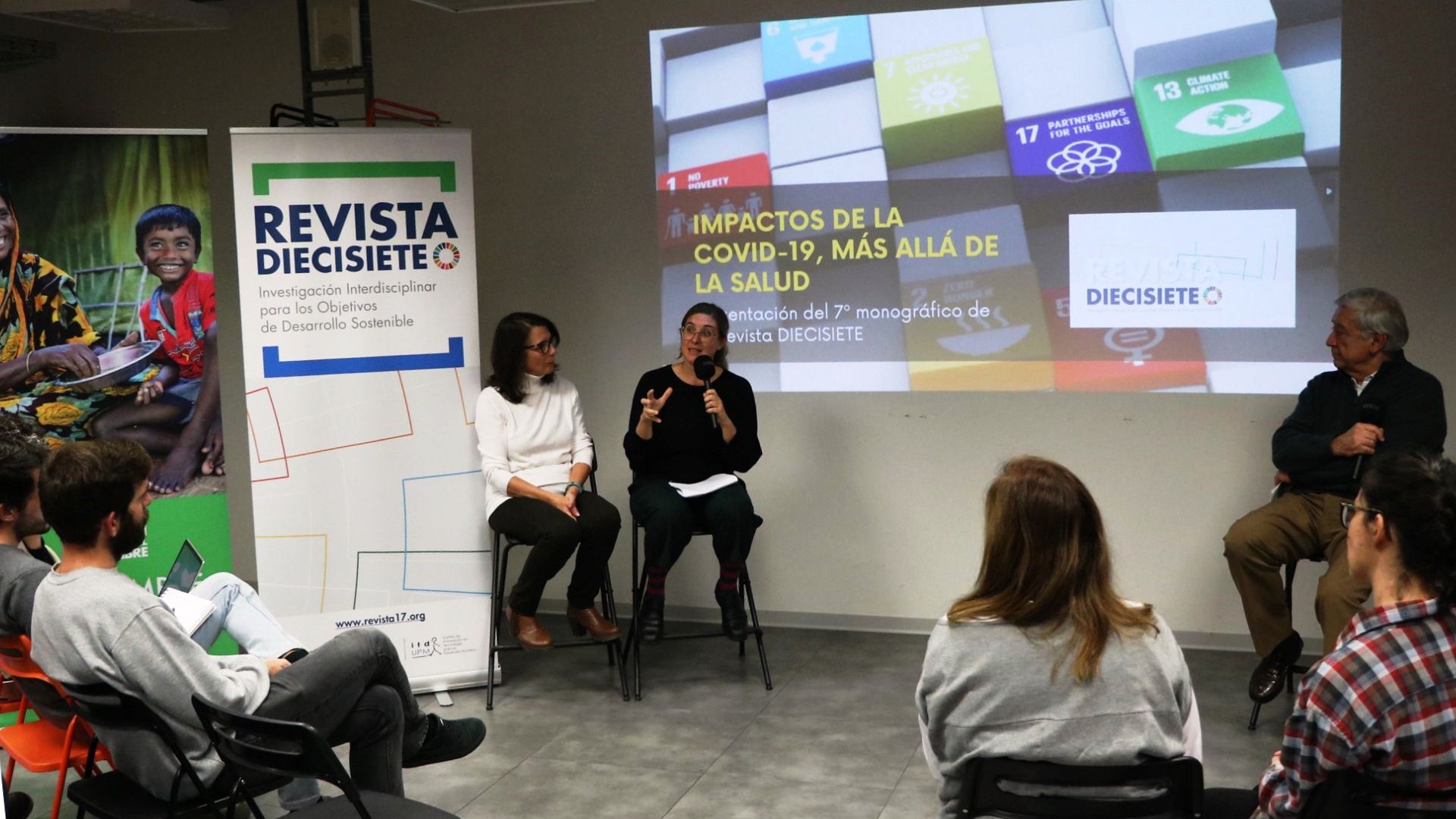The sum of knowledge, collaboration and political will constitute The triad for managing major challenges 'COVID-19 and its global impact beyond health', in the new issue of Journal Seventeen, now available
Teresa Sánchez, professor at the Escuela Técnica Superior de Ingenieros Industriales of the Universidad Politécnica de Madrid, Encarnación Sarria, professor at the Faculty of Psychology of the Universidad Nacional de Educación a Distancia (UNED) and Juan Gimeno Ullastres, Professor of Applied Economics (Political Economy and Public Finance) at the Universidad Nacional de Educación a Distancia.
The ravages of the pandemic have led to a food crisis and the economic slowdown has caused many families to lose their income. In countries where social protection systems are more fragile, they have been overwhelmed, unable to cope with the burden of vulnerability that came with the health crisis.
There are also possible positive effects, such as the acceleration of digitalisation in some sectors, some improvement in air quality or a shift towards more sustainable habits.
DIECISIETE Magazine has just launched a new monograph on how the pandemic has changed the most relevant areas of our societies. More than 20 international experts and researchers contribute to this issue, offering an in-depth and global perspective on the impact of the health crisis in socio-economic terms.
The ravages of the pandemic in socio-economic terms have led to a food crisis and the economic slowdown has caused many families to lose their income. In countries where social protection systems are more fragile, they have been overwhelmed, unable to cope with the burden of vulnerability that came with the health crisis. The impact on SDG 1 (poverty eradication) has been significant. After decades of progress on the targets of this goal, poverty has increased in 2020 in many regions of the world: it is estimated that, due to the pandemic, there are now 120 million more people living in extreme poverty. In the case of Spain, between the last quarter of 2019 and the first quarter of 2021, when most restrictions had been lifted, the number of households with no income increased by more than 10 per cent, and by mid-2020 the number had risen by more than 100,000 households from the pre-health crisis level.
Overall, the analysis of the level of achievement of the SDGs shows that the current pace of progress is insufficient and that, beyond the pandemic situation, there are structural difficulties in the Agenda that need to be addressed. Teresa Sánchez, professor at the School of Industrial Engineering of the Polytechnic University of Madrid, argues that one of the core of the problem lies in the tension between the need to address the SDGs in a comprehensive and systemic way - due to their highly complex and interrelated nature - and the need to focus efforts and prioritise actions. "Since 2019 we have been experiencing stagnation in the achievement of the SDGs. In disadvantaged countries, the social SDGs are regressing, with a great lack of basic social protection methods and, in the favoured countries, the climate agenda has taken a back seat," he stressed. "In the most advantaged countries, the climate agenda has taken a back seat," added Teresa Sánchez.
"During the pandemic we encountered social unrest, a loss of trust in institutions, polarisation, disruptions in electoral cycles... This, in certain regions, has only opened the door to more authoritarian behaviour," said Teresa Sánchez.
Returning to the context of population health, the COVID-19 pandemic has once again put pressure on the Spanish public health system, which has not yet recovered from the consequences of the 2008 crisis. Underlying the attention given to the pandemic is a long list of structural problems that have become endemic. In most of the cases analysed, the most important ones were already present before the crisis and COVID-19 has only aggravated many of them.
Moreover, such instability has also wreaked havoc on the mental health of the population. "Not everyone is equally affected by the pandemic. Those people in vulnerable situations, who do not have a context of well-being, can develop damage that manifests itself years later, in terms of psychological impact," added Encarnación Sarria, professor at the Faculty of Psychology of the National University of Distance Education (UNED).
Common learning: towards an equitable model
The reflections lead us to affirm that the old explanatory models are no longer valid, nor is the old growth model valid, nor is unequal and debilitating globalisation valid. The lessons that emerge from the management of the pandemic must be considered in order to achieve success in challenges such as the ecological transition. The COVID-19 crisis has shown that the future is not set in stone and that the sum of knowledge, collaboration and political will constitute a powerful triad for managing major challenges.
The editor of this new issue, Juan Gimeno, Professor of Applied Economics at the UNED and founder of Economists without Borders, stressed that COVID-19 has overturned many of the dominant forecasts and conventions; in the most relevant aspects, it has simply highlighted some of the structural problems that our economies have had for years. "In issue 7 we take different approaches to analyse this situation, not only by going deeper into the intellectual sphere, but also by going down to the ground to see what has happened, what things have changed", he pointed out.
The magazine looks first at the previous problems and then at the damage caused by the pandemic, which has been compounded by the conflict in Ukraine. "The wrong compass is taking us in the opposite direction to where we want to go. We have to opt for policies with a floor, a social base, and a ceiling, not destroying the resources that the planet provides us with," Gimeno said.
The video of the presentation can be seen here


